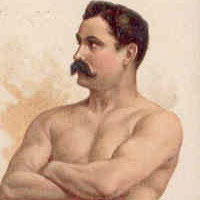Тхиебауд Бауер пориче да су радили мечеви у 1876
Тхиебауд или Тхеобалд Бауер је био француски рвач, који се специјализовао за рвање грчко-римским. Бауер је у Америку стигао током 1875 са сумњивим захтевом за Светско првенство у рвању у грчко-римској категорији у тешкој категорији. Одбранио би титулу за 5 године до пораза од Вилијама Малдуна у 1880. Ако су љубитељи рвања уопште упознати са Бауером, it is normally as the opponent Muldoon beat to claim the world title.
Wrestling fans in the 1870s would have been aware of another aspect of Bauer’s career. He was frequently accused of “working” шибице. Bauer and his opponents would agree to an outcome before the match and cooperate with each other in an exhibition instead of a legitimate contest. While this practice was common place in most of the 20th Century, gambling was a big part of 19th Century professional wrestling. Fans losing money on a “worked” match was a big concern and could damage the sport.

Artist rendering of Theobaud Bauer, Greco-Roman Wrestler of the 1870s and 1880s from the Public Domain
When Bauer arrived in St. Louis for a match in 1876, he was exposed by local prizefight promoter and former prizefighter Jack Looney. Looney owned a local bar and helped arrange bare knuckle prizefights on the uninhabited islands in the Mississippi River.
Prizefighting was illegal in the United States. Scheduling bouts on the islands helped to prevent police interference in the bouts because of the treacherous boat trips in the strong current of the Mississippi to land on an island, which may or may not be in your jurisdiction.
Whether from a grudge with Bauer, who was a frequent patron at the prizefights, or because Looney didn’t want competition for his prizefights, Looney exposed the practice of Bauer in May 1876.
It was common practice in professional wrestling for both contestants to but up a some of money that the other wrestler would be awarded, if he won the match. For example, each contestant would put up $300.00 страна. If Bauer won, he would get a higher percentage of the gate receipts plus the $300.00 side wager from his opponent.
Looney said it was common for Bauer and his opponent to pull their side wagers, agree to an outcome and then equally divide the gate receipts. Looney didn’t accuse them of making wagers on the outcome of the match but it would be easy to see how they could enrich themselves in this way through proxy bets.
Bauer responded by placing a challenge in the local paper on May 5, 1876 to meet Looney at any time to settle their differences in a fight. 10 years before, Looney may have jumped at the opportunity to meet Bauer. Nearing 50 years of age though, Looney decided not fight with Bauer in an early boxing versus wrestling bout.
Bauer returned to St. Louis in September 1876 for what was undoubtedly a worked match with frequent opponent William Miller. The exposure four months prior didn’t seem to have much affect on this match as the St. Louis Post-Dispatch called it “Bauer’s Bonanza”. Even in the 19th Century, wrestling fans were willing to suspend belief, if the match would be interesting or exciting.
Можете оставити коментар или поставити питање о овом или било ком посту у одељку за коментаре испод или на мом Фацебоок страна.
Sources: Свети. Лоуис Пост-Диспатцх, Мај 5, 1876 edition, p. 4 , Септембар 27, 1876 edition, p. 4 и октобра 2, 1876 edition, p. 4
Pin It
